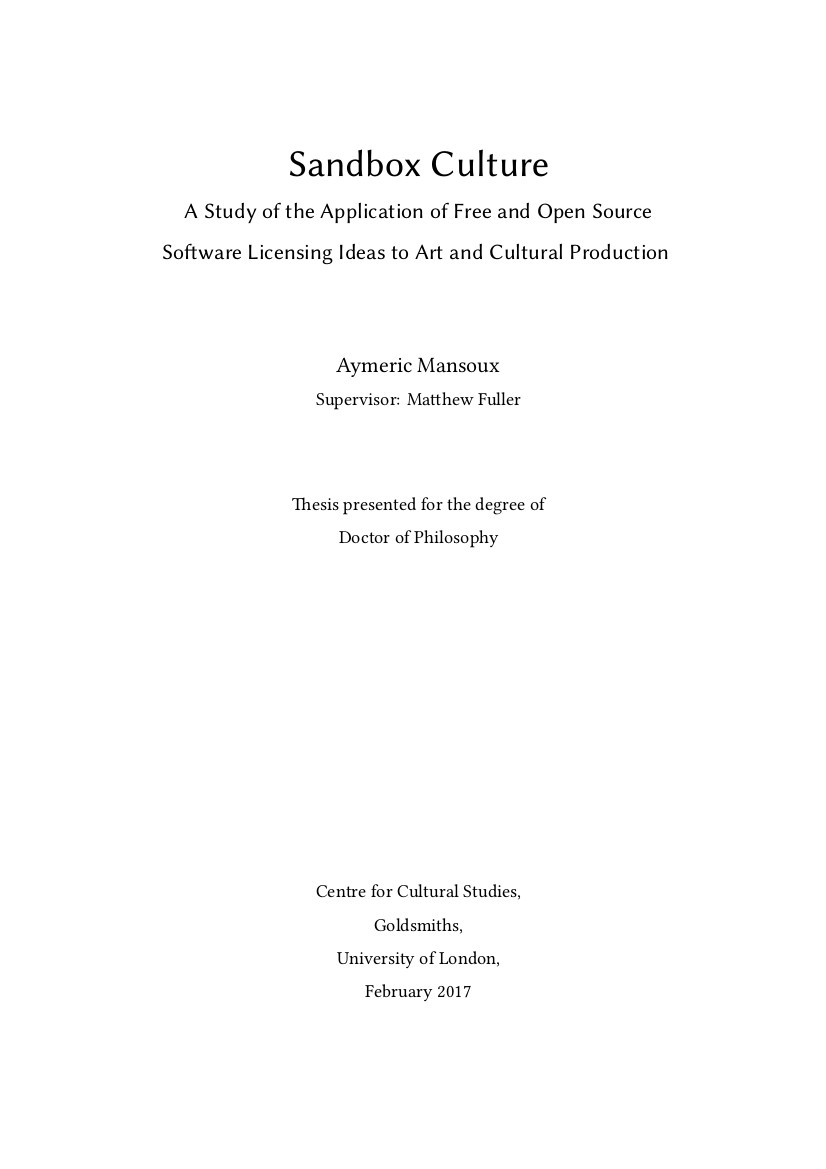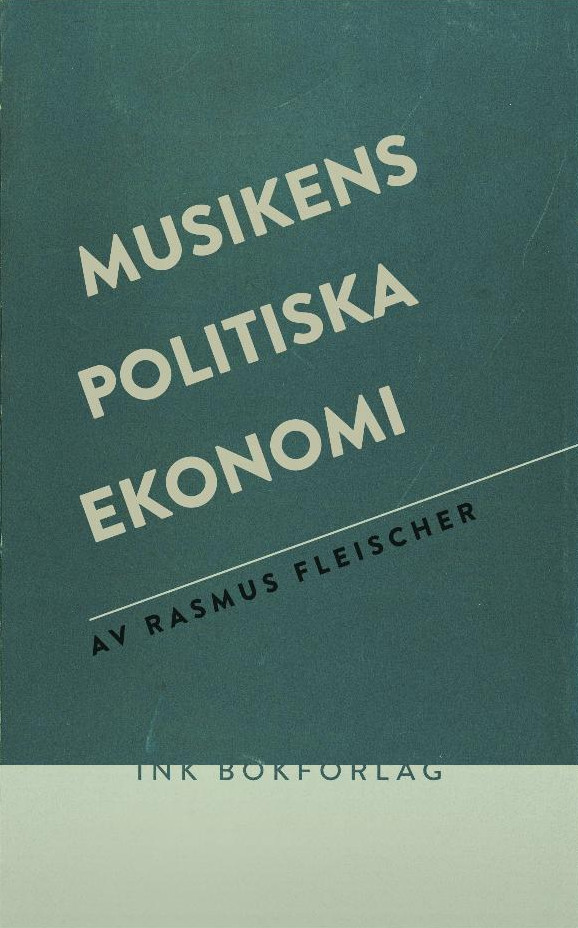Aymeric Mansoux: Sandbox Culture: A Study of the Application of Free and Open Source Software Licensing Ideas to Art and Cultural Production (2017)
Filed under thesis | Tags: · agonism, copyright, cultural production, digital culture, floss, free culture, intellectual property, law, network culture, open source, social movements

“In partial response to the inability of intellectual property laws to adapt to data-sharing over computer networks, several initiatives have proposed techno-legal alternatives to encourage the free circulation and transformation of digital works. These alternatives have shaped part of contemporary digital culture for more than three decades and are today often associated with the “free culture” movement. The different strands of this movement are essentially derived from a narrower concept of software freedom developed in the 1980s, and which is enforced within free and open source software (FLOSS) communities. This principle was the first significant effort to articulate a reusable techno-legal template to work around the limitations of intellectual property laws. It also offered a vision of network culture where community participation and sharing was structural.
From alternate tools and workflow systems, artist-run servers, network publishing experiments, open data and design lobbies, cooperative and collaborative frameworks, but also novel copyright licensing used by both non-profit organisations and for-profit corporations, the impact on cultural production of practices developed in relation to the ideas of FLOSS has been both influential and broadly applied. However, if it is true that FLOSS has indeed succeeded in becoming a theoretical and practical model for the transformation of art and culture, the question remains at which ways it has provided such a model, how it has been effectively appropriated across different groups and contexts and in what ways these overlap or differ.
Using the image of the sandbox, where code becomes a constituent device for different communities to experience varying ideologies and practices, this dissertation aims to map the consequent levels of divergence in interpreting and appropriating the free and open source techno-legal template. This thesis identifies the paradoxes, conflicts, and contradictions within free culture discourse. It explores the tensions between the wish to provide a theoretical universal definition of cultural freedom, and the disorderly reality of its practice and interpretation. However, despite the different layers of cultural diffusion, appropriation, misunderstanding and miscommunication that together form the fabric of free culture, this dissertation argues that, even though feared, fought, and criticised, these issues are not signs of dysfunctionality but are instead the evidence of cultural diversity within free culture. This dissertation will also demonstrate that conflicts between and within these sandboxes create a democratic process that permits the constant transformation of the free and open source discourse, and is therefore something that should be embraced and neither resisted nor substituted for a universal approach to cultural production.”
Includes an anthology of proto-free culture licenses, 1998-2002 (pp 382-452).
PhD Dissertation
Supervisor: Matthew Fuller
Publisher Centre of Cultural Studies, Goldsmiths, University of London, 2017
xxxviii+486 pages
via author
The Boy Who Could Change the World: The Writings of Aaron Swartz (2015)
Filed under book | Tags: · code, copyright, hacking, hacktivism, intellectual property, internet, internet activism, open access, web

“The writings of the computer genius and Internet hacktivist whose tragic suicide shook the world
In January 2013, Aaron Swartz, under arrest and threatened with thirty-five years’ imprisonment, committed suicide. He was twenty-six. But in his short life he had changed the world: reshaping the Internet, questioning our assumptions about intellectual property, and creating some of the tools we use in our daily online lives. He was also a leading critic of the politics of the Web.
In this collection of his writings that spans over a decade, Swartz displays his passion for and in-depth knowledge of intellectual property, copyright, and the architecture of the Internet. The Boy Who Could Change the World contains the life’s work of one of the most original minds of our time.”
With an Introduction by Lawrence Lessig
Publisher The New Press, New York/London, 2015
ISBN 162097066X, 9781620970669
368 pages
See also MIT prosecution report.
Comment (0)Rasmus Fleischer: Musikens politiska ekonomi: lagstiftningen, ljudmedierna och försvaret av den levande musiken, 1925-2000 (2012) [Swedish]
Filed under book | Tags: · copyright, economics, music, music history, political economy, sweden

Historical study on copyright legislation and media technology in the 20th century.
“This book explores the intersections of politics and technology, economy and aesthetics. It concerns the changing preconditions for the commodification of music during the 20th century, caused by the use of loudspeakers and radio broadcasting, primarily in Sweden.
It was around 1930 that “live music” (levande musik) became a concept, strictly opposed to that of “mechanical music”, suggesting a kind of “aura” in the common presence of musicians and audience. About the same time, cinema musicians lost their employment and musicians’ trade unions began to fear that the “mechanization of music” would have disastrous consequences. The thesis explores how and why musicians – but also record companies – were granted legal rights to compensation for the use of recorded music, internationally standardized in the Rome Convention (1961). This led to new institutions of economic redistribution for the benefit of musicians. A recurrent problem was derived from the ambivalent status of musicians as royalty-earning artists and/or wage-earning workers.
Another problem was the practical impossibility of monitoring the actual use of loudspeaker music. The thesis shows how legislators have avoided the hardest decisions, preferring to delegate these to collecting societies. Furthermore, it highlights the influential role of Fascist Italy as an early partner of the record industry lobby. Musicians’ unions, on the other hand, allied themselves with the ILO (International Labour Organization), in opposition to the record industry.
In the 1960s, the “aura” of musical performance was questioned by avantgardists and bureaucrats. However, the trend changed in the 1970s with the rise of a leftist-radical music movement. Its idea about authenticity was absorbed by government agencies and by the Musicians’ union. The years 1977–82 marks a peak in the unionist struggle against “mechanical music”, with a brief but heated conflict between disc-jockeys and instrumentalists. The last empirical chapter examines the sudden rise of interest in “music export” within the context of the “new economy” of the 1990s.
Empirically, this thesis draws on a wide range of sources covering the period of 1925–2000: governmental investigations, publications from the Swedish Musicians’ Union, and archival material. The theoretical basis may be described as critical theory, which is combined with materialist media theory in the attempt to clarify how “music” can be sold as a commodity, while at the same time remain as an activity outside of the market. ”The political economy of music” is thus defined as a process of mediation, which may be understood as a dialectic of industrialization and aestheticization.”
Based on Ph.D. thesis from the Department of History, Lund University, 2012.
Publisher Ink bokförlag, Stockholm, 2012
ISBN 9197846945, 9789197846943
v+630 pages
via rsms
Reviews: Staffan Albinsson (Scandinavian Economic History Review, 2013, EN), Ulrik Volgsten (Respons, 2013, SW).
Author, (2)
Publisher (archive.org)
WorldCat

